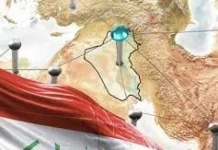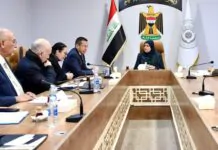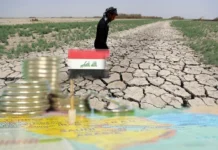Financial Stability Dilemma
Catastrophic Figures: Iraq Is Drowning In Debt. Dangerous Indicators Portend A Bleak Future For The Economy.
Baghdad Today – Baghdad Iraq’s public finances are experiencing a critical phase, with government policies intersecting with accumulating obligations and increasing economic pressures.
This situation is no longer simply a matter of numbers; it has become a test of economic governance and the state’s ability to balance operational spending with sustainable financing.
****************************************
Official data indicates that domestic debt reached approximately 87 trillion dinars by mid-2025, while a proposal to issue new bonds worth 5 trillion dinars to pay contractors’ dues is looming, potentially raising the figure to approximately 97 trillion dinars.
According to legal readings, any unforeseen expansion of domestic debt requires strict controls and legislation to prevent it from becoming a long-term burden.
Economist Nabil Al-Marsoumi warned in a statement on his Facebook page, followed by Baghdad Today, of the alarming rise in domestic debt. He noted that “the Ministerial Council for the Economy recommended issuing bonds worth 5 trillion dinars to pay contractors’ dues, which some sources indicate amount to 7 trillion dinars.
If the government approves this recommendation, it will raise the domestic debt to more than 97 trillion dinars.” This warning reflects genuine concern about excessive reliance on domestic debt instruments to finance operational obligations rather than productive projects.
In-depth legal analyses confirm that the continuation of this financing pattern will weaken the monetary authority, raise inflation, reduce private sector financing, and increase the burden of debt service, which reached 9.3 trillion dinars in 2024.
In parallel, economist Manar Al-Obaidi previously offered a critical assessment of other economic policies, which he believes have contributed to deepening the deficit despite massive oil revenues of nearly $300 billion between 2022 and 2024.
Al-Obaidi notes that “the decision to devalue the dinar from 1,450 to 1,310 to the dollar increased state expenditures by about 40 trillion dinars and exacerbated the fiscal deficit,” in addition to the jump in current expenditures from 104 to 125 trillion dinars and the increase in the wage bill from 43 to 60 trillion dinars over two years.
According to him, the domestic debt rose from 69 to more than 85 trillion dinars by mid-2025, relying primarily on the liquidity of public and private banks, which depleted their resources and impacted economic activity. Comparative legal research shows that such policies in similar countries lead to inflated debt without achieving real growth.
The Prime Minister’s financial advisor, Mazhar Mohammed Salih, offers a more reassuring official reading in previous press statements.
*********************************************
Salih asserts that “the ratio of external and domestic public debt does not exceed 33% of GDP, an indicator that places Iraq within a comfortable and low-risk global credit rating.
” He adds that “domestic debt amounts to 85 trillion dinars, half of which is invested in the Central Bank of Iraq’s investment portfolio, and the remainder is held by government banks and the public in bonds and transfers.”
He explains that “external debt does not exceed 8% of GDP, most of which are long-term loans for the reconstruction of liberated areas.” He also points out that Iraq has written off approximately $100 billion of its external debt under the Paris Club agreement, and that the remainder will be paid off by 2028 with the final foreign private sector debt of $2.7 billion.
According to independent research estimates, this ratio makes Iraq less vulnerable to risks compared to similar countries, but it does not mean that uncontrolled domestic borrowing will be safe.
The result is that Iraq faces three clear paths: the first is represented by Al-Marsoumi’s warnings of domestic debt ballooning to approximately 97 trillion dinars if new bonds are issued;
the second is expressed by Al-Obaidi through a critical assessment of fiscal policies that have undermined stability despite the oil abundance; and
the third is Saleh’s official reading, which confirms that overall debt ratios remain within globally safe standards. Comparative analyses suggest that the challenge lies not in the size of the debt alone, but in how to manage it and link it to sustainable development plans that ensure that borrowing funds are transformed into productive investments rather than a renewable burden.
Ultimately, issuing new bonds to pay contractors’ dues is not a simple financial choice, but rather a decision that requires a balance between meeting urgent obligations and maintaining long-term financial stability.
The logical conclusion is that the government needs a clear public debt strategy that combines fiscal discipline with development planning, to prevent financing tools from becoming shackles that shackle a fragile economy rather than saving it.
Source: Baghdad Today Monitoring and Follow-up Department https://baghdadtoday.news/284215-.html
An Oil Expert Explains The Importance Of The Baghdad-Kurdistan Agreement And Its Impact On The Global Market.
Economic: Al Furat News} Oil expert Furat al-Moussawi considered the oil agreement between Baghdad and the Kurdistan Region a strategic and important agreement that paves the way for future legislation of a new oil and gas law. He noted that the next three months will be a litmus test of the extent of all parties’ commitment to its provisions.
The useful summary… You can find important news on the Euphrates News channel on Telegram
*****************************************
During his appearance on the “Free Talk” program on Al Furat TV, Al-Moussawi said, “Iraq has suffered for more than twenty years from financial and economic problems that have affected the salaries of the region’s employees,” noting that “there are clear clauses in the agreement and others that remain ambiguous.”
He pointed out that “Iraq has been restricted in expanding industrial and development projects due to a production quota described as unfair, as its production ceiling has been set at 4.6 million barrels per day since 2018.”
Al-Moussawi explained that “Iraq attempted to negotiate with OPEC to increase its oil quota, but the negotiations did not achieve the desired results due to the quantities produced in the region outside SOMO’s quota.
These quantities were deducted from Iraq’s OPEC quota and set at 1.4 million barrels from October 2024 until the end of October 2025, which harmed Iraq’s financial revenues and reputation within the organization.”
The expert discussed the demands of oil companies operating in the region, stating that “one of these demands was addressed by setting $16 as an approximate average figure, with an international company to determine the transportation and cost costs to pay those companies’ dues, amounting to approximately $1 billion, which was transferred to the federal government.”
He added, “The previous contract between the region and foreign companies was based on production-sharing, but a compromise formula was reached that allowed for the writing of a new law.
Eight companies also requested to sign new contracts with the Baghdad government to guarantee their rights, with the federal government paying the companies $16 in kind through deducting oil quantities, not in cash. This was considered an achievement for those companies, with the agreement to postpone payment of the $1 billion.”
Despite the agreement’s importance, Al-Moussawi described it as “cautious due to its potential financial and legal risks,” noting that “Turkey seeks to cancel the Ceyhan pipeline and conclude a new agreement by the end of 2026, while Iraq has rushed to pump the region’s oil through the existing pipeline to increase its negotiating leverage with Ankara.”
He added, “The region’s oil companies are looking to sign formal international agreements with the federal government,” stressing that “Iraq will participate in the upcoming OPEC meeting on October 5, where it was agreed to raise its quota to 4 million and 220 thousand barrels per day, including between 800 and 900 thousand barrels for domestic consumption, with full commitment to the quota to strengthen its position in subsequent negotiations to increase it.”
Al-Moussawi explained that “Iraq views the Ceyhan pipeline as a strategic option for diversifying export outlets and preventing any smuggling attempts,” noting that “the region’s oil quantities will be counted toward Iraq’s OPEC quota,” noting that “oil derivative prices in the region are very high due to the reliance on private refineries.”
He concluded his remarks by stressing that “setting the 50% share for the region is not the end of the road, as Baghdad will work to raise it to 70% and also supply the region with kerosene and gasoline to ease the burden on citizens.” LINK
For current and reliable Iraqi news please visit: https://www.bondladyscorner.com





